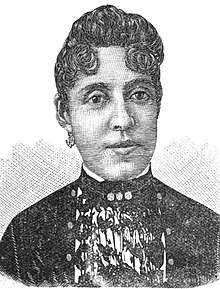Amelia Tilghman
Amelia Louise Tilghman (surname also spelled Tiligman; 6 September 1856 District of Columbia – 12 December 1931 District of Columbia) (pronounced "TILL man") was a pianist, teacher, and activist who, among other things, founded the first African-American journal devoted to music, The Musical Messenger, published from 1886 to 1891.[1]

Biography and work
Amelia Tilghman, the daughter of Margaret Ann Reynolds (maiden; 1819–1903) and Henry Hyland Tilgman (1811–1900), grew up in a free black middle-class family in Washington, District of Columbia, Her voice was so remarkable that the bishop of the African Methodist Episcopal Church apparently once declared, “the child’s parents had better spend a hundred dollars on her voice not than leave her a fortune when they die.” Instead, she enrolled in the Normal School of Howard University, graduated in 1870,[2] and accepted a full-time job as a teacher in the black Georgetown public schools in 1870.
After fourteen years, she relocated to Boston where studied music pedagogy with Samuel Jamieson (1855–1930) at the Boston Conservatory of Music, though she never graduated with a degree.
In addition to her work as a teacher, Tilghman pursued a career as a pianist. She performed at Steinway Hall in Manhattan, New York, in 1880 and was described by a reviewer as "a musical star of the first magnitude."[3] The following year, she was the invited soloist at Saengerfest, a festival at the Grand Opera House in Louisville, Kentucky. There, she heard a choral work of William Batchelder Bradbury, Esther, the Beautiful Queen and was so enamored that she decided to organize, direct, and star in a production of the piece in Washington, D.C. The performance, at Thanksgiving, 1881, was hailed as “a grand success,” for it proved that “there is talent which needs but to be intelligently and thoroughly trained to produce really artistic performances.”[3]
In early 1886, for reasons unknown, Tilghman relocated to Montgomery, Alabama, where she took a job in the public schools. When she arrived, reflected a journalist, looking back from 1893, “there were no colored pianists in Montgomery, and in no house where colored people lived did one hear in passing the artistic rendition of music as is now heard in almost every two or three squares.” During her first year in town, Amelia organized a recital of her students in a local Congregational Church.[3]
The Musical Messenger
In Montgomery, Tilghman founded the first African-American music journal, a monthly publication called The Musical Messenger. This entrée into journalism was not easy for her, as men dominated the field at the time and for years after women reported facing prejudice. The journal’s tagline was “the highest moral, social and intellectual interest of the people.” The two surviving issues of the publication—both from 1889—focus on educating its readers about music history (such as the biography of Hayden), church choir repertoire, and sharing and circulating the names and work of African-American composers. “That the race stands sadly in need of such a journal should be freely admitted. It is our earnest hope that the educator’s hands may be strengthened and her soul fortified in this very creditable venture,” wrote the Philadelphia Tribune.[4]
Tilghman returned permanently to Washington, D.C., to assist with the care of her seriously ill mother in 1888. There, she hired the musician and teacher Lucinda B. Bragg Adams (1870-1932) as an associate editor for The Musical Messenger. While roundly celebrated, the publication was not profitable.
Later life
Tilghman discontinued the publication and refocused her energies on teaching after 1891. She died in 1931.
References
- Walker-Hill, Helen. From Spirituals to Symphonies: African-American Women Composers and Their Music. 1st Illinois paperback edition, University of Illinois Press, 2007. pps. 3, 22, 23 OCLC 943318504
- Howard University Alumni Directory: 1870–1919 Howard University, p. 3
- Karpf, Juanita. "'As with Words of Fire:' Art Music and Nineteenth-Century African-American Feminist Discourse." Signs (University of Chicago Press), Vol. 24, No. 3, Spring 1999, pps. 604–605, 609–626 (accessible via JSTOR at www
.jstor , subscription required)..org /stable /3175320 - Scruggs, Lawson Andrew (1857–1914). Women of Distinction: Remarkable In Works And Invincible In Character. Raleigh: L. A. Scruggs, 1893, p. 211 OCLC 982940440